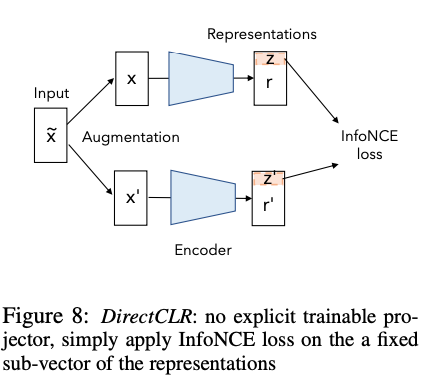UNDERSTANDING DIMENSIONAL COLLAPSE IN CONTRASTIVE SELF-SUPERVISED LEARNING
Introduction
-
What is the name of the DirectCLR paper?
UNDERSTANDING DIMENSIONAL COLLAPSE IN CONTRASTIVE SELF-SUPERVISED LEARNING
Li Jing, Pascal Vincent, Yann LeCun, Yuandong Tian, FAIR
- What are the main contributions of the DirectCLR paper?
- show how contrastive self-supervised learning on images suffers from dimensional collapse
- mechanisms causing dimensional collapse
- Strong augmentation along feature dimension
- implicit regularization favoring low rank solutions
- Contrastive learning objective that outperforms SIMCLR
- Dimensional Collapse is where the embedding vectors end up
spanning a
lower-dimensional subspaceinstead of the entire available embedding space.- problem in both contrastive and noncontrastive self-supervised learning methods

Method
-
DirectCLR theory: dimensional collapse caused by
strong augmentationWith fixed matrix X (defined in Eqn 6) and strong augmentation such that X has negative eigenvalues, the weight matrix W has vanishing singular values.
-
DirectCLR theory: dimensional collapse caused by
implicit regularization -
DirectCLR design: take a fixed
subvector of representationsProposition 1. A linear projector weight matrix only needs to be diagonal. Proposition 2. A linear projector weight matrix only needs to be low-rank.

Results
-
DirectCLR results: outperfroms
SIMCLRwith no learnable projector
Reference
@article{https://doi.org/10.48550/arxiv.2110.09348,
doi = {10.48550/ARXIV.2110.09348},
url = {https://arxiv.org/abs/2110.09348},
author = {Jing, Li and Vincent, Pascal and LeCun, Yann and Tian, Yuandong},
keywords = {Computer Vision and Pattern Recognition (cs.CV), Artificial Intelligence (cs.AI), Machine Learning (cs.LG), FOS: Computer and information sciences, FOS: Computer and information sciences},
title = {Understanding Dimensional Collapse in Contrastive Self-supervised Learning},
publisher = {arXiv},
year = {2021},
copyright = {Creative Commons Zero v1.0 Universal}
}
